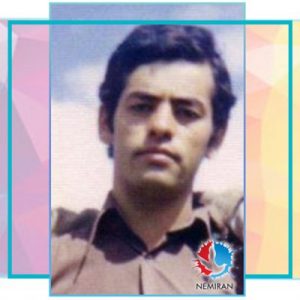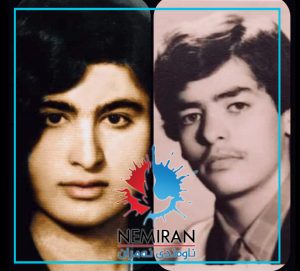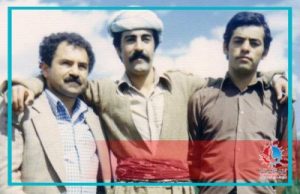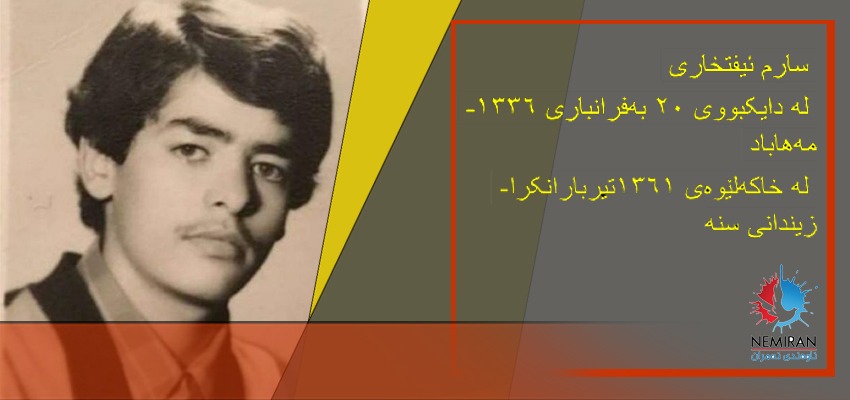Comrade Sarem was born on 20.10.1336 Iranian Calendar (10.01.1958) in the city of Mahabad to a middle-class family. He completed his primary education up to the fourth grade in this city and then the rest of his education in Teheran from 1347 (1968) up to graduation from high school. His parents were both teachers. They moved to Teheran because of Sarem’s older brother who studied at Alborz boarding school. Sarem’s brother didn’t like to live alone in Teheran. Sarem soon became acquainted with the political issues around him due to the presence of political and cultural figures in the family and their acquaintances. He was admitted to the Polytechnic University of Ariamehrin the field of mechanical engineering in 1355 (1976). He became acquainted with Marxism and took great interest in it.

Shortly before the revolution, he became acquainted with the comrades of Mojahedin and joined them. He continued his activity in Peykar organization. He was sent to Mahabad and Oshnowyeh by the organization in 1358 (1979) as the responsible member of that section. There he worked hard with tact and dedication to develop the organization and to help the toilers, whom he knew well. Comrade Sarem was one of the first people who went to the city of Sanandaj to defend the city and to confront the Islamic Regime alongside the Kurds, when the regime attacked. Meanwhile he was well known to the Revolutionary Guards and the government of the Islamic Republic as a steadfast communist. Because of his steadfastness, agility, great activity and as a talented organizer, the organization sent him to Balochistan province for some time to help the comrades in that region. After returning to Kurdistan, he worked with other Peshmergas for some time in Mahabad, Oshnoyeh, Bukan and villages in the Mokrian area. Later he settled in Sanandaj to organize the underground section of the organization. He secretly engaged in a wide range of activities among the Kurdish youth and working class people. Comrade Sarem was one of the five main members of the organization in Kurdistan.
He married Fereshteh Fayeghi, a comrade of the Saqqez organization in late summer of 1360 (1981). He and his wife were unfortunately arrested in the winter of 1360 (1981) and transferred to Sanandaj prison due to the internal crisis of the organization and police persecution. His mother tried so much to visit him in prison, but his family didn’t get the permission to see him. Comrade Sarem was finally shot dead in Sanandaj prison in early 1361 (April 1982) after bravely resisting torture and harassment. The prison authorities buried in him secretly in a cemetery in Qorveh City.
Comrade Salim, the head of the Kurdistan section of the Peykar Organization remembers: ”Sarem was one of the first members and cadres of the organization in Kurdistan. Fereshteh was the first woman to join us in Saqqez City. After the second war against Kurdistan, we decided to expand organization’s activities in the cities. We sent persons who were already known by the Intelligence Service in Kurdish region to other places in order not to be noticed. We sent Sarem and his wife to Sanandaj to form an underground group there. Sarem was arrested after the internal crisis and fragmentation in the organization. Fereshteh was arrested on the street shortly after him in a suspicious way, but the relationship between them was not clear to the regime in the beginning. Fereshteh was almost released dissembling not to know anything about the political issues. Unfortunately, a sympathizing Kurdish student was arrested in Tabriz City. He betrayed her. The result of this was severe torture. She was executed later.”

“Nobody knew about the activities of Comrade Sarem in Sanandaj prison for a long time. But he was betrayed by traitors. He was severely tortured when the regime realized the extent of his responsibilities. Comrade Sarem and his wife did not give the slightest information to the enemy. They were known as symbols of resistance in Sanandaj and Qorveh prisons. These two loving Comrades sang all the time in prison, despite a lot of pain and wounds. They encouraged other fellow prisoners.” This is a citation and memoirs of Comrade Salim.
A witness who was in prison with Sarem recalls: “In order to force Sarem to repent and confess on television, the famous Mullah Mesbah Yazdi was brought to Sanandaj to discuss ideology with Sarem. After the discussion, he said that Sarem Eftekhari could turn him into an unbeliever rather than convert Sarem to Islam.”
The government subjected him to the most severe physical and mental torture and executed him.
Finally, he was shot dead in mass executions in Qorveh prison in early 1361 (1982). They were even afraid of his mutilated body. They only half buried the body in the desert near the city of Qorveh, far away from his family. He was wrapped in a white cloth with his name written on it. A shepherd found him near his farm and removed his name from his neck and buried the body.
Sarem’s brother recalls: “Many comrades left Kurdistan and lived in other regions in underground during the crisis situation of winter 1360 (1980) following the enduring arrests of the Peykar activists. My sister and I went to Teheran and lived in secret. Sarem was the only member of the Peykar organization in Kurdistan who remained in Sanandaj. At that time Sarem traveled to Teheran to collect some facilities to help the organization’s supporters in Sanandaj. During a meeting with my brother in Teheran, I pointed out to him that returning to Sanandaj would be very hazardous, being arrested and executed would be possible. He replied very clearly that he considers himself responsible for the lives of all the supporters of the organization in this critical situation. He told that he would not leave Sanandaj until he settles the last fan in a safe place. The reason for his trip to Teheran was to raise funds and so on to help those people.”

Sarem’s sister also wrote about him: “Sarem reacted strongly against inequity in his childhood. He strived for the equality of human beings and the equality of men and women. He expressed his views bravely against inequalities trying to persuade, change, or influence the other side. Sarem was a fearless and brave person. Everyone was forced by the Shah’s Regime to join the Party of Rastakhiz (the monarchist party), he was one of the few who refused to do that. Sarem was always one of the best students in the class. He was popular because he helped other classmates. Everyone was happy to keep company with him. Relatives and friends were proud of him. He expressed his views clearly, but he did not hurt others. The power of his speech was so good that he could argue against their attitude. He was a selfless man who believed in humanism before he thought of his own interests.”
May his soul rest in peace.


